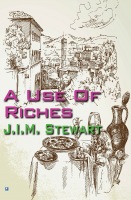A Use Of Riches
J.I.M. Stewart
Description:
Rupert Craine is a wealthy, cultured banker, who treats problems of high finance and additions to his collection of paintings with equal seriousness. He is aware, however, that his wife’s first husband, who was killed in the war in Italy, was a brilliant artist. Something strange occurs when drawings by the latter suddenly appear on the market and a telegram summons Craine and his wife to Italy. There, the past grotesquely and irresistibly explodes into the present. ‘The author manages to depict the English social maze through his hero's intrigued and piercing gaze.’
Reviews:
A mastery of situation. Holds the reader confidently in its grip.
Mr. Stewart is a born astonisher ... A superb piece of story-telling.
Only once or twice since the end of World War II have I read a novel as good as Mr. J. I. M. Stewart's 'A Use of Riches'. This is a mature, rich yet delicate and most skilfully constructed novel in the grand manner and a stately tradition. It is intelligent, bold and sensitive. It is quietly and elegantly simple in narrative, yet brilliantly complex and subtle in texture. I am certain that I shall read it again and again and discover new depths of wisdom and beauty in it.
Author biography:
J.I.M. Stewart John Innes Mackintosh Stewart was born in Edinburgh in 1906. His father was Director of Education and as was fitting the young Stewart attended Edinburgh Academy before going up to Oriel College, Oxford where he obtained a first class degree in English. Amongst his undergraduate contemporaries were Christopher Isherwood and W.H. Auden. Stewart observed the latter during their final examinations, where Auden emerged with a third, and later stated how the "tears were coursing down his pale and ample cheeks." Stewart won the Matthew Arnold Memorial Prize and was named a Bishop Frazer's scholar.After a short interlude travelling with AJP Taylor in Austria, including studying Freudian psychoanalysis for a year, he embarked on an edition of Florio's translation of Montaigne's Essays, which secured him a post teaching English at Leeds University.
In 1932, he married Margaret Hardwick, who practised medicine, and they subsequently had three sons and two daughters, one of whom is also a writer. By 1935, he had been awarded the Jury Chair at the University of Adelaide in Australia as Professor of English and had also completed his first detective novel, 'Death at the President?s Lodging', published under the pseudonym 'Michael Innes'. This was an immediate success and part of a long running series centred on 'Inspector Appleby', his primary character when writing as 'Innes'. There were almost fifty titles under the Innes banner completed during his career. Very early in his writing career, Stewart managed to establish himself as a late Golden Age Detective Story writer and as a highly cultivated and entertaining writer.
In 1946, Stewart returned to the UK and spent two years at Queen's University in Belfast, before being appointed Student (Fellow and Tutor) at Christ Church, Oxford. He was later to hold the post of Reader in English Literature of Oxford University and upon his retirement was made an Emeritus Professor. Whilst never wanting to leave his beloved Oxford permanently, he did manage to fit into his busy schedule a visiting Professorship at the University of Washington and was also honoured by other Universities in the UK.
Stewart wrote many works under his own name, including twenty-one fiction titles (which contained a highly acclaimed quintet entitled 'A Staircase in Surrey', centred primarily in Oxford, but with considerable forays elsewhere, especially Italy), several short story collections, and over nine learned works on the likes of Shakespeare, Kipling and Hardy. He was also a contributor to many academic publications, including a major section on modern writers for the Oxford History of English Literature.
He died in 1994, the last published work being an autobiography: 'Myself and Michael Innes'. His works are greatly admired for both their wit, plots and literary quality, with the non-fiction acknowledged as being definitive.



